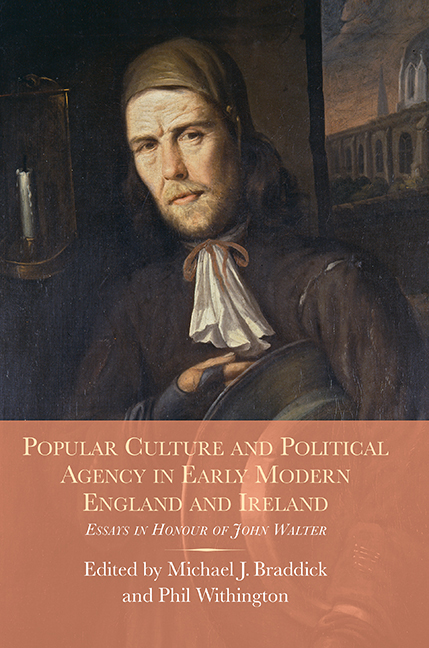 Popular Culture and Political Agency in Early Modern England and Ireland
Popular Culture and Political Agency in Early Modern England and Ireland Book contents
- Frontmatter
- Contents
- List of Illustrations
- List of Contributors
- Acknowledgements
- List of Abbreviations
- Introduction
- 1 John Walter and the social history of early modern England
- 2 Contrasting susceptibility to famine in early fourteenth- and late sixteenth-century England: the significance of late medieval rural social structural and village governmental changes
- 3 The politics of English political economy in the 1620s
- 4 Provision, household management and the moral authority of wives and mothers in early modern England
- 5 Popular senses of past time: dating events in the North Country, 1615–1631
- 6 Spectral lordship, popular memory and the boggart of Towneley Hall
- 7 Self-image and public image in the career of a Jacobean magistrate: Sir John Newdigate in the Court of Star Chamber
- 8 Gender, agency and religious change in early Stuart England
- 9 ‘A Standard which can never fail us’: the Golden Rule and the construction of a public transcript in early modern England
- 10 Religion, anti-popery and corruption
- 11 An ‘Aristotelian moment’: democracy in early modern England
- 12 John Lilburne and political agency in revolutionary England
- 13 An Irish Protestation? Oaths and the Confederation of Kilkenny
- 14 ‘Whereat his wife tooke great greef & died’: dying of sorrow and killing in anger in seventeenth-century Ireland
- Bibliography for John Walter
- Index
- Tabula Gratulatoria
- Miscellaneous Endmatter
13 - An Irish Protestation? Oaths and the Confederation of Kilkenny
Published online by Cambridge University Press: 09 May 2017
- Frontmatter
- Contents
- List of Illustrations
- List of Contributors
- Acknowledgements
- List of Abbreviations
- Introduction
- 1 John Walter and the social history of early modern England
- 2 Contrasting susceptibility to famine in early fourteenth- and late sixteenth-century England: the significance of late medieval rural social structural and village governmental changes
- 3 The politics of English political economy in the 1620s
- 4 Provision, household management and the moral authority of wives and mothers in early modern England
- 5 Popular senses of past time: dating events in the North Country, 1615–1631
- 6 Spectral lordship, popular memory and the boggart of Towneley Hall
- 7 Self-image and public image in the career of a Jacobean magistrate: Sir John Newdigate in the Court of Star Chamber
- 8 Gender, agency and religious change in early Stuart England
- 9 ‘A Standard which can never fail us’: the Golden Rule and the construction of a public transcript in early modern England
- 10 Religion, anti-popery and corruption
- 11 An ‘Aristotelian moment’: democracy in early modern England
- 12 John Lilburne and political agency in revolutionary England
- 13 An Irish Protestation? Oaths and the Confederation of Kilkenny
- 14 ‘Whereat his wife tooke great greef & died’: dying of sorrow and killing in anger in seventeenth-century Ireland
- Bibliography for John Walter
- Index
- Tabula Gratulatoria
- Miscellaneous Endmatter
Summary
John Walter's book, Covenanting Citizens: The Protestation Oath and the Making of a Popular Parliamentarian Culture in the English Revolution, transforms our view of the popular background to the civil wars that broke out in England in 1642. It also offers a gripping account of the high political struggle to divide the nation along religious lines and to consolidate a very broad Protestant coalition against the catholicising actions of Charles I (at the very least his indifference to the threat of popery) and to put Ministers of the Word in charge of a mass mobilisation of hearts and minds. It is a story of progressive radicalisation. It began in early May 1641, at a moment of supreme stress that coincided with separate failed and foiled coups by the King and by the queen and that were intended both to save the Earl of Strafford from the axe, and also in the long run to shake the king free from a new dependence on a Parliament that he could not legally dissolve. Amid much acrimony and mutual suspicion, the Protestation was passed by the Commons on 3 May and was printed in slightly different versions two days later. Then, in the late winter of 1641/2 it was reissued and was made a campaign of mass subscription, with full sets of subscribers (and lists of non-subscriber) returned to Parliament. The taking of the Protestation was to be a bond that inspired and shaped the political choices of many people of all social groups throughout the 1640s.
This chapter is intended as an adornment to John's great book. It examines the Oath (or, as it turns out, oaths) taken by the ‘rebels’ in Ireland in the years 1641–7. It shows how, from March 1642 onwards, the English Protestation was (at least as a mirror image) an inspiration to Irish Catholics, who intended their fierce loyalty to the House of Stuart and modest claims to religious liberty, as a rebuke to Puritan-parliamentarianism. The chapter explores why the Confederate Catholics were unable to agree on a single form of the Oath and it explores the ethnic and social tensions revealed by that failure. The Irish Protestation was, in many respects, more radical than the English Protestation, but – partly as a result – it was far less effective in meeting its immediate and longer-term purposes.
- Type
- Chapter
- Information
- Popular Culture and Political Agency in Early Modern England and IrelandEssays in Honour of John Walter, pp. 243 - 266Publisher: Boydell & BrewerPrint publication year: 2017
